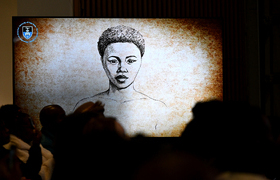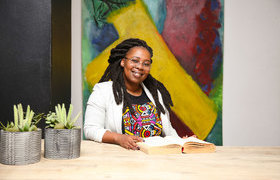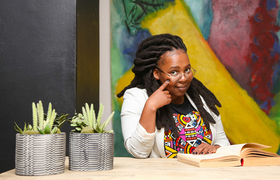Students redefine health through African feminism
24 November 2025 | Story Myolisi Gophe. Photos Supplied. Read time 8 min.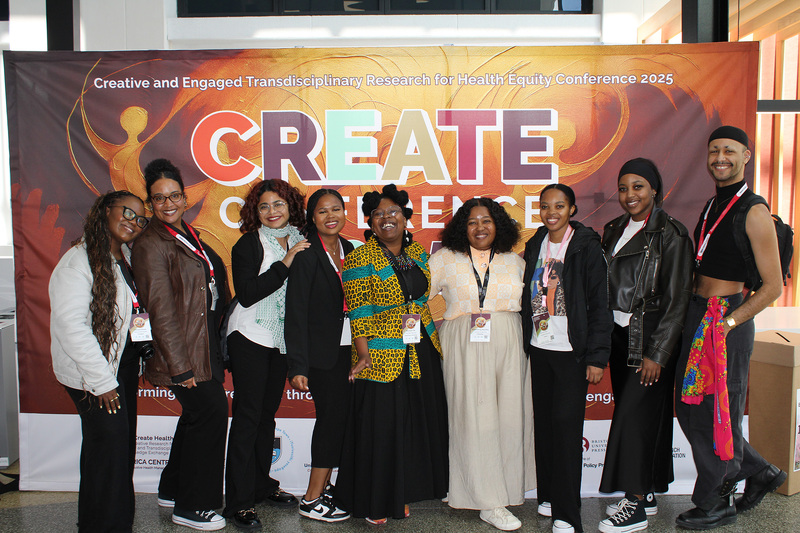
The University of Cape Town’s (UCT) African Feminist Studies honours students made their mark at the Creative and Engaged Transdisciplinary Research for Health Equity in Africa (CREATE 2025) conference, where they challenged Western definitions of health and called for more inclusive, decolonial approaches to healing and well-being.
Convened by Dr Neziswa Titi in the Faculty of Humanities, the African Feminist Studies honours programme equips students to interrogate gender through critical theorisations of race, racialisation, indigeneity and language, rooted in the African feminist paradigms. Through these lenses, the class has engaged in rigorous analysis of access to institutions, such as health and education, highlighting how intersecting systems of power shape lived experiences continentally and globally.
Dr Titi was part of the organising team of CREATE 2025, which was hosted in Cape Town by Stellenbosch University and other transdisciplinary institutions recently. The partnership enabled students to engage in the conference through volunteering, presenting, and attending sessions for learning.
“Health equity cannot be achieved by science alone.”
“Our contribution speaks to the transformation and social responsiveness objectives of UCT,” said Titi. “Although co-convened with other partners, this conference had a strong inclusion agenda, one that aligns with our vision of exposing students to different disciplines, institutions and international perspectives.”
CREATE 2025 was a first-of-its-kind gathering on the continent that repositioned creativity, community engagement and inclusion as key drivers of equitable health research and innovation. It aimed to align with the United Nations Sustainable Development Goals (SDGs) related to good health, reduced inequalities, gender equality and climate action, while fostering new partnerships across local and global contexts.
Health beyond science
The conference’s transdisciplinary approach encouraged collaboration among researchers, artists, community advocates and health professionals. Participants explored how art, technology and indigenous knowledge could reshape the way health research is imagined and practised.
“Health equity cannot be achieved by science alone,” said Titi. “CREATE 2025 recognised that sustainable change emerges when different disciplines and knowledge systems intersect.”
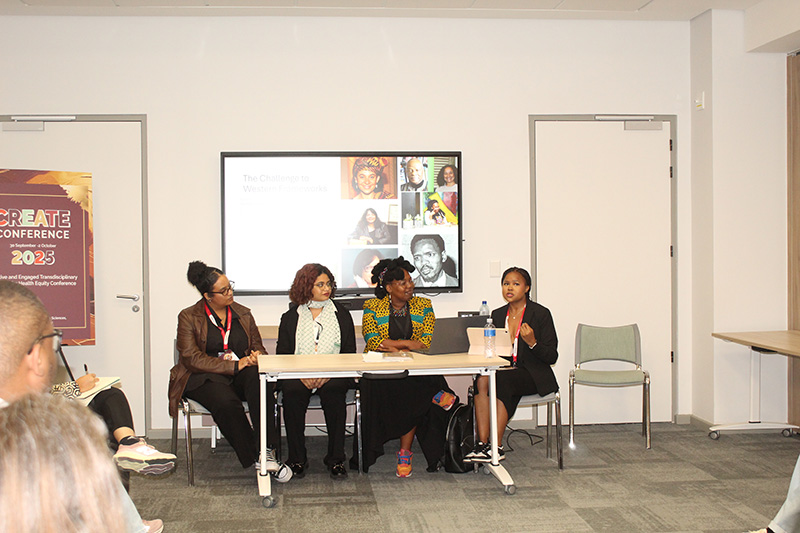
It was within this spirit of cross-disciplinary engagement that UCT honours students Cleo Fortuin, Onwabile Vakalisa and Sobaagh Zoutenberg presented their honours research in the “Decolonising Health Research, Language, Racialisation and Indigenous Methodologies in an African Feminist Context” roundtable discussion with Titi.
The three were part of the 18 students who participated in the event. Among them were master’s and doctoral students Derek Linda, Gemma Paton, Imameleng Masitha and Laura Pirez, whose presentations reflected the depth of African feminist inquiry on child-centric methodologies, embodiment, racial exclusion and indigenous games.
The students’ inputs highlighted how health definitions, language bias and racialisation shape experiences of wellness and access to care, particularly for marginalised communities.
For instance, Vakalisa’s research calls for health to be understood holistically, including spiritual well-being as an integral part of the African experience.
“We like to think of ourselves as individuals connected through mind, body and soul,” she explained. “But where do we place spiritual health? In African contexts, spiritual experiences deeply affect our physical and emotional well-being. If these are excluded from health systems, we are not being fully cared for.”
Drawing from her own activism and rural upbringing in the Eastern Cape, Vakalisa reflected on how spirituality and ethics intersect in African feminist research: “Research itself can be a healing process when we consciously decentre ourselves as researchers and become aware of how we use power.”
Her study, “Interpreting the Language of Violence: Intersectional Experiences of Institutional and Intra-Movement Control Among Black Womxn Student Activists During the #FeesMustFall and #RhodesMustFall Protests in South Africa”, explores how institutional violence is a communicative act through the lived experiences of black women student activists.
Language and power in healthcare
Zoutenberg reflected on how colonial languages and Eurocentric epistemologies continue to shape South Africa’s medical system, often alienating patients from their own indigenous knowledge.
“Much of the healthcare system operates in English, a colonial imposition that carries a heavy history,” she said. “When we centre English, we centre whiteness and erase local languages and worldviews.”
Their contribution reveals that language is more than a tool for communication; it structures who is heard and understood in healthcare settings. Everyday indigenous practices, like home remedies and traditional healing, are often dismissed as unscientific, despite being the first form of care for many African households.
“When we centre English, we centre whiteness and erase local languages and worldviews.”
“We lose part of ourselves when our languages are excluded,” she said. “Language bias reinforces inequality and limits our ability to express illness and healing in culturally grounded ways.”
Fortuin’s research focuses on racialisation, intersectionality and health disparities, particularly within the coloured communities of the Cape Flats.
“You can’t speak about health without speaking about race and intersectionality,” she said. “During my fieldwork in Heideveld and Manenberg, women repeatedly linked their treatment in healthcare spaces to race, class and gender.”
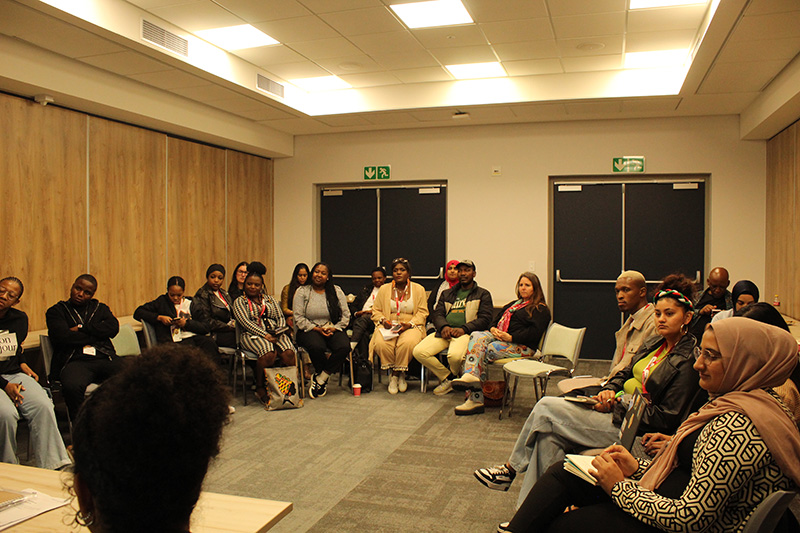
As a young woman racialised as coloured from Manenberg, Fortuin’s study also reflects her lived experience. “When I compare clinics back home to those in Mowbray or Rondebosch, the difference in service delivery is stark. It made me question whether the treatment is subpar because we’re poor, because we’re women, or because of racialisation,” she said.
Seeking to clarify decolonial African-centred feminism, Titi steered the conversation to gender justice, to which Fortuin emphasised that African feminism is not about opposing men but about dismantling patriarchal systems. “African feminism advocates for men too,” she noted. “Patriarchy affects black men as well.”
As Vakalisa reflected, “If we co-create knowledge and understanding as African people, we can move away from fear and isolation toward holistic well-being.”
For Titi, this engagement demonstrates how academic research can be both transformative and socially responsive, and how mentoring can be embedded in teaching. “By participating in this conference, our students are not only applying critical feminist lenses to contribute to global health discourses – they are reimagining what it means to be well, to belong, and to be heard; and how they can accentuate their voices in rooms of thought leaders,” she said.
 This work is licensed under a Creative Commons Attribution-NoDerivatives 4.0 International License.
This work is licensed under a Creative Commons Attribution-NoDerivatives 4.0 International License.
Please view the republishing articles page for more information.







